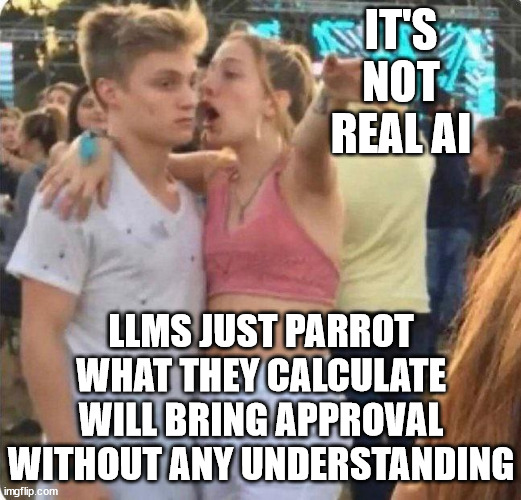this post was submitted on 05 Feb 2024
661 points (88.2% liked)
Memes
47501 readers
1679 users here now
Rules:
- Be civil and nice.
- Try not to excessively repost, as a rule of thumb, wait at least 2 months to do it if you have to.
founded 5 years ago
MODERATORS
you are viewing a single comment's thread
view the rest of the comments
view the rest of the comments

Hmm it seems like we have different perspectives. For example i cannot do something i don't understand, meaning if i do a calculation in my head i can tell you exactly how i got there because i have to think through every step of the process. This starts at something as simple as 9 + 3 wher i have to actively think aboit the calculation, it goes like this in my head: 9 + 3... Take 1 from 3 add it to 9 = 10 + 2 = 12. This also applies to more complex things wich on one hand means i am regularly slower than my peers but i understand more stuff than them.
So i think because of our different... Thinking (?) We both lack a critical part in understanding each other's view point
Anyhow back to ai.
Yeah that's the problem where does the spectrum start... Like i wouldn't call a virus, bacteria or single cell intelligent, yet somehow a bunch of them is arguing about what intelligence is. i think this is just case of how you define intelligence, wich would vary from person to person. Also, I agree that llms are unfathomably complex. However i wouldn't calssify them as intelligent, yet. In any case it was an interesting and fun conversation to have but i will end it here and go to sleep. Thanks for having an actual formal disagreement and not just immediately going for insults. Have a great day/night
And I wouldn't call a human intelligent if TV was anything to go by. Unfortunately, humans do things they don't understand constantly and confidently. It's common place, and you could call it fake it until you make it, but a lot of times it's more of people thinking they understand something.
LLMs do things confident that they will satisfy their fitness function, but they do not have the ability to see farther than that at this time. Just sounds like politics to me.
I'm being a touch facetious, of course, but the idea that the line has to be drawn upon that term, intelligence, is a bit too narrow for me. I prefer to use the terms Artificial Narrow Intelligence and Artificial General Intelligence as they are better defined. Narrow referring to it being designed for one task and one task only, such as LLMs which are designed to minimize a loss function of people accepting the output as "acceptable" language, which is a highly volatile target. AGI or Strong AI is AI that can generalize outside of its targeted fitness function and continuously. I don't mean that a computer vision neural network that is able to classify anomalies as something that the car should stop for. That's out of distribution reasoning, sure, but if it can reasonably determine the thing in bounds as part of its loss function, then anything that falls significantly outside can be easily flagged. That's not true generalization, more of domain recognition, but it is important in a lot of safety critical applications.
This is an important conversation to have though. The way we use language is highly personal based upon our experiences, and that makes coming to an understanding in natural languages hard. Constructed languages aren't the answer because any language in use undergoes change. If the term AI is to change, people will have to understand that the scientific term will not, and pop sci magazines WILL get harder to understand. That's why I propose splitting the ideas in a way that allows for more nuanced discussions, instead of redefining terms that are present in thousands of ground breaking research papers over a century, which will make research a matter of historical linguistics as well as one of mathematical understanding. Jargon is already hard enough as it is.